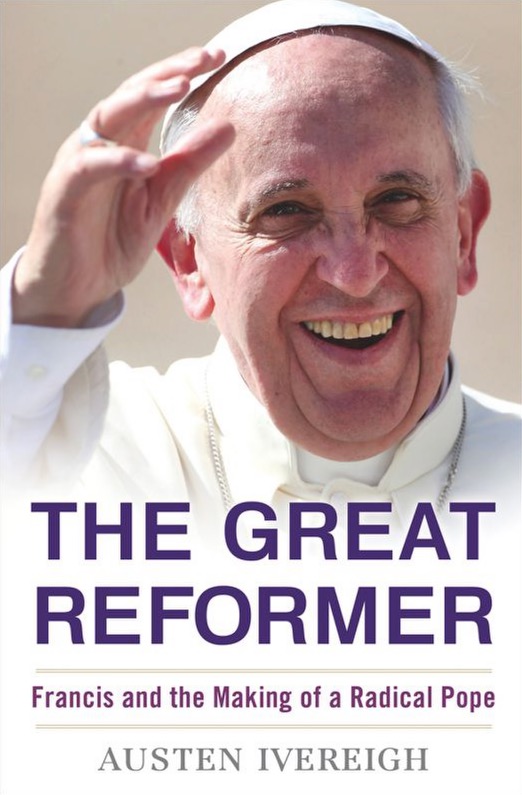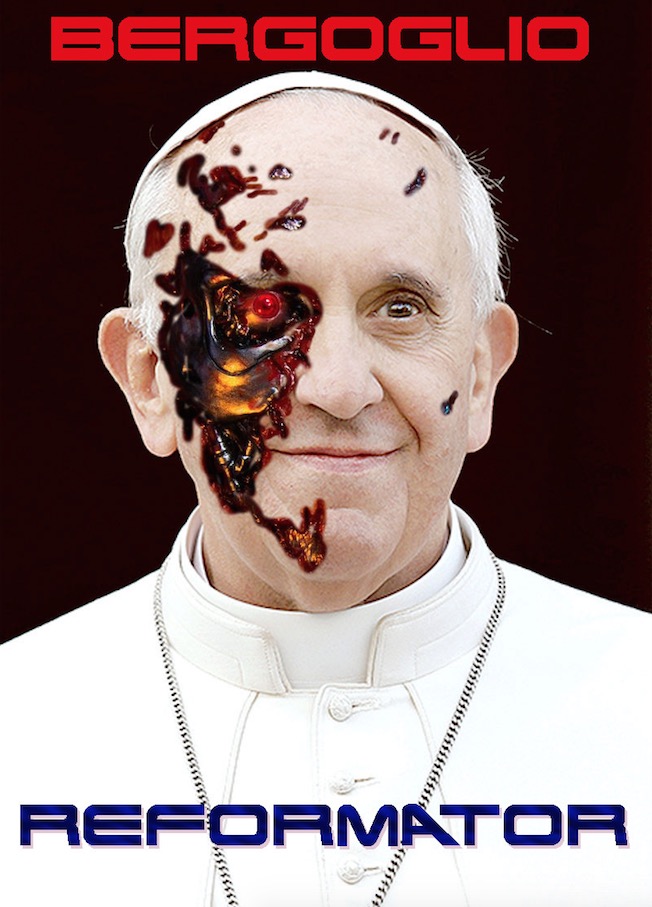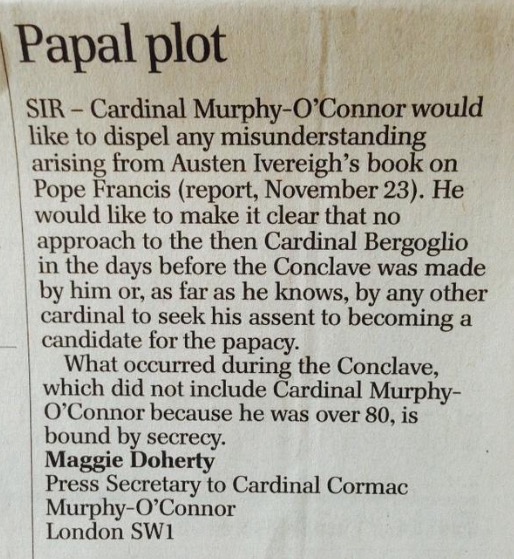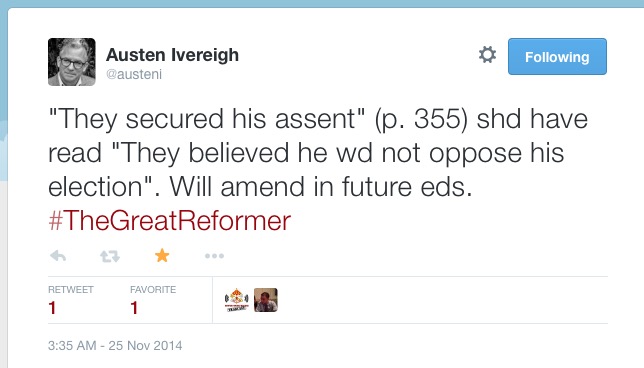As in: “Reformation”…

“The Great Reformer”:
Another Book causes Problems for the Vatican
A few months after the release of Antonio Socci’s inconvenient book Non È Francesco, in which the author claims that Benedict XVI’s resignation was invalid and Francis is not in fact the Pope, another book has now appeared that is getting Francis into hot water, though this time the dispute over Francis’ validity was entirely unintended by the author. The book in question is Austen Ivereigh’s 445-page biography The Great Reformer: Francis and the Making of a Radical Pope.
Dr. Ivereigh, once the press secretary of the “Archbishop” of Westminster, “Cardinal” Cormac Murphy-O’Connor, is a veteran journalist and author. His biography of Jorge Bergoglio is clearly professional, a thoroughly-researched book that is very well-written. When it was first published in the latter half of November, Ivereigh went to the Vatican to hand a copy to Francis in person.
Unlike Socci, Ivereigh is definitely an admirer of Francis, which, together with his professional research and writing, makes things all the more difficult for the Vatican now, as they cannot simply dismiss him as some whacko who has an axe to grind with the church and who is not to be taken seriously.
But before we get into the details about what is getting Francis into trouble this time, let’s look at a few links to sundry book reviews and interviews with Ivereigh about The Great Reformer, which is the most comprehensive biography of the Vatican’s current papal pretender to-date (keep in mind these links are all to Novus Ordo or secular sources):
- The Great Reformer: Francis and the Making of a Radical Pope by Austen Ivereigh, Review: ‘invaluable’ (The Telegraph)
- Book review: ‘The Great Reformer,’ Pope Francis, by Austen Ivereigh (Washington Post)
- Pope Francis: a new biography that reveals the Pontiff’s quirky side (Catholic Herald)
- Unraveling the ‘Francis Enigma’ (National Catholic Register)
- Shaping a Shepherd of Catholics, From Argentine Slums to the Vatican (New York Times)
- Reformer and Radical: A Life of Pope Francis (America / Podcast)
- Interview with Austen Ivereigh on The Great Reformer (Relevant Radio / Podcast)
- Is Francis a “Radical Pope”? (FOX News / Video)
- Antony Bushfield interviews Austen Ivereigh (Premier)
- Ivereigh publishes biography on Pope Francis with facts on his time as the Jesuit Provincial (Rome Reports)
Ivereigh also appeared on the “conservative” Modernist flagship station EWTN’s current-affairs program, The World Over with Raymond Arroyo:
The program “Vatican Connections” on the Canadian Novus Ordo Salt + Light TV also conducted an interview with Bergoglio’s biographer, below:
Interview with Ivereigh starts at 6:13 into the video
And finally, Ivereigh was interviewed together with David Gibson of Religion News Service on the Novus Ordo show “In the Arena” with “Mgr.” Kieran Harrington:
So, why are we making all of this information available? Are we trying to promote Francis? Far from it: We’re simply trying to provide information on a newly-released book that is making a huge impact around the world and in the Vatican, a book that is taken seriously by the “mainstream” and that even Francis happily received a copy of. As far as Novus Ordo Land is concerned, this book is the definitive biography of their head honcho. In short: Take notice. This biography is a huge deal — what it says carries weight, and in the future, writers and journalists will be referring to it again and again when talking about the person Jorge Bergoglio.
Needless to say, none of these people singing the praises of Francis is actually a real Catholic, so do not be misled by their glowing endorsements of Mr. Bergoglio. If you need a quick refresher on how empty is all this talk about how Bergoglio wants to “bring Christ to the world” by “letting him out of the sacristy”, etc., see the following small sample of sobering links:
- Who is “Pope” Francis? What you need to know about Jorge Mario Bergoglio
- Francis says he doesn’t care what religion people are
- Francis confirms Muslims in Unbelief
- Francis says Jews don’t need Jesus Christ
- Francis denies the Most Holy Trinity
- Apostasy at the Vatican
- Francis a Proponent of Homosexuality
- Flip Flop Francis: The Hypocrisy & Contradictions of Jorge Bergoglio
Ivereigh’s biography is 445 pages long, consisting of a total of nine chapters and an epilogue. What’s been receiving most of the attention, however, including the Vatican’s, is one chapter in particular, Chapter 9: The Conclave.
This is where it gets hairy: Ivereigh’s research has revealed that after Benedict XVI stepped aside but before the actual conclave, a group of “cardinals” the author dubs “Team Bergoglio” started canvassing for the election of their man — in violation of the rules of the conclave laid down by “Saint” John Paul II in 1996. To make matters worse for the Vatican, Bergoglio himself is said to have been not only aware of the campaign, but of having given his explicit consent. Ivereigh writes verbatim:
They [Kasper, Lehmann, Danneels, Murphy-O’Connor] first secured Bergoglio’s assent. Asked if he was willing, he said that he believed that at this time of crisis for the Church no cardinal could refuse if asked. (Murphy-O’Connor knowingly warned him to “be careful,” that it was his turn now, and was told: capisco, “I understand.”) Then they got to work, touring the cardinals’ dinners to promote their man, arguing that his age— seventy-six— should no longer be considered an obstacle, given that popes could resign.
Austen Ivereigh, The Great Reformer: Francis and the Making of a Radical Pope (Henry Holt and Co.: Kindle Edition), locs. 6899-6903; see p. 355 of hardcopy edition.)
The British Telegraph broke the story on November 23, 2014:
“Team Bergoglio”, according to Ivereigh’s research, was headed by four Novus Ordo “cardinals” in particular: Walter Kasper and Karl Lehmann (both of Germany), Godfried Danneels (of Belgium), and Cormac Murphy-O’Connor (of England). Having been a close associate of “Cardinal” Murphy-O’Connor, Ivereigh’s revelations, in particular with regard to the English cardinal’s role, are entirely credible — which explains why only two days later, The Telegraph published an official denial issued by the “Archdiocese” of Westminster’s press secretary, Maggie Doherty (Ivereigh’s successor in that role):
Apparently Ivereigh was not aware of the momentous consequences of his findings, because after the above-linked Telegraph article was published, Ivereigh sent out an embarrasing tweet attempting to control the damage, backpedaling on his details regarding Bergoglio’s explicit consent, even promising to change the text in future editions:
As Ivereigh is neither a poor researcher, nor a sloppy writer, nor a man hostile to “Pope” Francis, what he says about the pre-conclave lobbying and Bergoglio’s consent must for these reasons alone be taken seriously — and has been even by the Vatican, who rushed to diffuse Ivereigh’s explosive revelation (more on that below).
So, what is the problem? The problem is that the governing Novus Ordo law regarding the election of the “Pope”, found in the 1996 “Apostolic Constitution” Universi Dominici Gregis by “Pope” John Paul II, imposes an automatic excommunication on any cardinals who commit themselves or others to voting for a particular candidate:
The Cardinal electors shall further abstain from any form of pact, agreement, promise or other commitment of any kind which could oblige them to give or deny their vote to a person or persons. If this were in fact done, even under oath, I decree that such a commitment shall be null and void and that no one shall be bound to observe it; and I hereby impose the penalty of excommunication latae sententiae upon those who violate this prohibition. It is not my intention however to forbid, during the period in which the See is vacant, the exchange of views concerning the election.
(John Paul II, “Apostolic Constitution” Universi Dominici Gregis, n. 81)
So much for the excommunication part. This alone would not be enough to cause trouble — it is only in connection with the following general ecclesiastical law that real problems arise for the Argentine apostate by the Novus Ordo Church’s own standards:
Can. 171 §1. The following are effected to vote:
…
3/ a person under a penalty of excommunication whether through a judicial sentence or through a decree by which a penalty is imposed or declared;
…
§2. If one of the above is admitted, the person’s vote is null, but the election is valid unless it is evident that, with that vote subtracted, the one elected did not receive the required number of votes.
(1983 Novus Ordo Code of Canon Law, can. 171; underlining added.)
So, if the claims made in The Great Reformer are true, Mr. Bergoglio has a big problem: His election may just have been invalid by his own church’s standards.
No, this isn’t a bunch of sedevacantists trying to find another reason Francis isn’t Pope — we really couldn’t care less about this particular issue, as it is of no concern to us what Novus Ordo law says anyway, or whether a bunch of apostates violated it — this is an issue that has been acknowledged to be a problem by some clearly Novus Ordo sources. There would have been no need for the “Archdiocese” of Westminster to issue an immediate denial, nor for the “Holy See” Press Office to do the same (see below), if there were no pressing concern here. Nor, presumably, would Ivereigh have issued a tweet “correcting” his own words unless this were a most serious matter.
In particular, it is the anti-sedevacantist “traditionalist” Novus Ordo blog From Rome that has focused most exhaustively on this issue and provided a lengthy collection of information and evidence that demonstrates the problems Ivereigh’s revelations — now conveniently retracted in part — are creating for Francis.
Here is a complete list of From Rome‘s informative blog posts on the “Team Bergoglio” story:
- If Ivereigh is to be believed, was Bergoglio’s election invalid? (Nov. 25)
- Ivereigh + UDG 81 = A Radical Problem for the Pope (Nov. 27)
- Fr. Lombardi denies Ivereigh’s allegations (Dec. 1)
- The Chronology of Reports on “Team Bergoglio” (Dec. 2)
- Vatican Radio seeks to kill story on “Team Bergoglio” (Dec. 4)
- Ivereigh backtracks to protect “Team Bergoglio” from penalties of UDG 81 (Dec. 5)
- Ivereigh knew of UDG 81 on March 12, 2013 (Dec. 6)
- Cardinal Murphy-O’Conner admits Pope Francis recognized his leadership of “Team Bergoglio” (Dec. 6)
- 4 Ways the “Team Bergoglio” Revelations undo Francis’ papacy (Dec. 7)
- Public Questions for the Vatican that need to be Answered (Dec. 8)
- The Great Reformer: Francis and the Making of a Radical Pope (Dec. 9)
- The Monstrosity of the Allegations against “Team Bergoglio” = Cardinal Bergoglio is not the Pope (Dec. 12)
- The Improbity of Team Bergoglio’s Recent Denials (Dec. 13)
That “Team Bergoglio” is making waves is also acknowledged by so-called “mainstream” journalists, even if some want to dismiss it. For example, John L. Allen, Jr., a seasoned Novus Ordo expert on the Vatican, writes:
Other journalists and news organizations, on both sides of the Atlantic, mention the issue of “Team Bergoglio” as a concern as well:
- Pope Francis, beyond the paradigm of discontinuity (Monday Vatican)
- Solving the “Enigma” of Pope Francis (Adam Shaw / FOX)
- Author, cardinals spar over reports of conclave campaigning (Catholic News Agency)
- La “squadra di Bergoglio” (Libertà e Persona)
- Il caso del “Team Bergoglio” (La Stampa)
- Ivereigh + Universi dominici gregis 81 = Ein radikales Problem für den Papst (Katholisches)
But what’s most interesting is that a denial of campaigning, canvassing, or similar efforts — and especially that of Bergoglio’s alleged complicity in them — came from no less significant a source than the Vatican’s own press office, directly from the mouth of spokesman “Fr.” Federico Lombardi:
The after-the-fact denials and “corrections”, however, do not seem convincing. The content of Chapter 9 in Ivereigh’s biography of “Pope” Francis speaks for itself — the evidence is too detailed to have been made up, or to be mistaken, considering Ivereigh’s status and credibility not only as a researcher and writer but also specifically as the former spokesman for the “Archdiocese” of Wesminster, working closely together with “Cardinal” Murphy-O’Connor.
The From Rome blog addresses the various denials and shows them to lack credibility:
As a general rule of thumb: Believe nothing about the Modernist Vatican until it’s been officially denied.
What to make of all this?
It is clear that Jorge Bergoglio is not the Pope of the Catholic Church. However, this is so not because of a violation of certain conclave rules drawn up by John Paul II, but because the man, Bergoglio, manifestly rejects Catholic dogma and has already done things — such as declaring the scandalous John Paul II a “saint” — that a true Pope would be divinely prevented from doing (see examples here).
It is important to understand that we’re not saying that there cannot be a bad Pope. Yes, there is such a thing as a bad Pope, but what we have here is a heretical “Pope”, and that’s a completely different case altogether. (For more on this, see “The ‘Bad Popes’ Argument.”)

Like the Terminator, but worse:
Francis is the Reformator
What’s amazing and really quite pathetic in all of this is to see that people who would never question Francis’ legitimacy on the grounds of divine law — i.e., because the man is an apostate and not a Catholic or has done things the Church says a real Pope cannot do — are showing themselves now entirely willing to consider that he may not be the Pope after all, but on the grounds of merely human law (conclave rules).
Case in point: Bro. Alexis Bugnolo of the From Rome blog. An avid anti-sedevacantist, he has no qualms about accusing Francis of heresy, yet has always insisted the Vatican II papal claimants are valid Catholic Popes. But now, with these allegations about a violation of conclave rules drawn up by John Paul II, he is willing to doubt the legitimacy of Jorge Bergoglio as “Pope” of the Conciliar Church.
Does this make any sense? It is a divine law — doctrine, not discipline — that in order to be a Roman Catholic, you must profess the Roman Catholic Faith (see Pope Pius XII, Encyclical Mystici Corporis, n. 22); but from this it follows, as explained by St. Robert Bellarmine, that a public heretic cannot be the head of the Catholic Church, and there is no doubt, objectively speaking, that Francis is a heretic, nay worse, an apostate.
Perhaps it is that the legal argument against Bergoglio somehow feels “cleaner” to people than the doctrinal argument, and thus allows them to feel more comfortable asserting that Francis is not or may not be the Pope. Notice, however, that the emphasis is on “feel” — it is a matter of emotion rather than reason for them, because the doctrinal argument, as it argues from ontology rather than from legality, is inherently much more powerful than the legal argument.
Arguments from ecclesiastical laws and legal technicalities also seem the preferred way of the “Resignationists”, who are pinning their hopes on the idea that Benedict XVI’s resignation from the “papal office” in February of 2013 was not valid, or, alternatively, that “Cardinal” Angelo Scola was elected before Bergoglio, thus making it impossible for Francis to be Pope.
Francis is so blunt in his apostasy and in his sneering at everything that is pious and holy, venerable and traditional that he makes Benedict XVI look like an altar boy serving High Mass for Pope St. Pius X, but make no mistake about it: Joseph Ratzinger is by no means a Catholic, either, but a Modernist of the worst kind, the kind that seeks to cloak the poison of heresy in beautiful vestments, eloquent Latin, and apparent gestures of good will towards traditionalists. The objective facts are sobering:
- Why Joseph Ratzinger is not a Catholic
- The Motu Inapproprio: Dissecting Benedict XVI’s Summorum Pontificum
We should end this post by drawing people’s attention to a beautiful quote from the great Pope Pius X, a saint canonized in 1954, who directly refuted the bogus soup-kitchen gospel of Jorge Bergoglio over 100 years ago:
We wish to draw your attention, Venerable Brethren, to this distortion of the Gospel and to the sacred character of Our Lord Jesus Christ, God and man, prevailing within the Sillon and elsewhere. As soon as the social question is being approached, it is the fashion in some quarters to first put aside the divinity of Jesus Christ, and then to mention only His unlimited clemency, His compassion for all human miseries, and His pressing exhortations to the love of our neighbor and to the brotherhood of men. True, Jesus has loved us with an immense, infinite love, and He came on earth to suffer and die so that, gathered around Him in justice and love, motivated by the same sentiments of mutual charity, all men might live in peace and happiness.
But for the realization of this temporal and eternal happiness, He has laid down with supreme authority the condition that we must belong to His Flock, that we must accept His doctrine, that we must practice virtue, and that we must accept the teaching and guidance of Peter and his successors.
Further, whilst Jesus was kind to sinners and to those who went astray, He did not respect their false ideas, however sincere they might have appeared. He loved them all, but He instructed them in order to convert them and save them. Whilst He called to Himself in order to comfort them, those who toiled and suffered, it was not to preach to them the jealousy of a chimerical equality. Whilst He lifted up the lowly, it was not to instill in them the sentiment of a dignity independent from, and rebellious against, the duty of obedience. Whilst His heart overflowed with gentleness for the souls of good-will, He could also arm Himself with holy indignation against the profaners of the House of God, against the wretched men who scandalized the little ones, against the authorities who crush the people with the weight of heavy burdens without putting out a hand to lift them.
He was as strong as he was gentle. He reproved, threatened, chastised, knowing, and teaching us that fear is the beginning of wisdom, and that it is sometimes proper for a man to cut off an offending limb to save his body.
Finally, He did not announce for future society the reign of an ideal happiness from which suffering would be banished; but, by His lessons and by His example, He traced the path of the happiness which is possible on earth and of the perfect happiness in heaven: the royal way of the Cross. These are teachings that it would be wrong to apply only to one’s personal life in order to win eternal salvation; these are eminently social teachings, and they show in Our Lord Jesus Christ something quite different from an inconsistent and impotent humanitarianism.
(Pope St. Pius X, Apostolic Letter Notre Charge Apostolique, 1910; underlining and pargraph breaks added.)
Francis continually reduces the saving Gospel of our blessed Lord Jesus Christ to that “impotent humanitarianism” which focuses entirely on the needs of the body without tending to the needs of the soul; it extols the corporal works of mercy at the expense of the spiritual works. Yet: “Fear ye not them that kill the body, and are not able to kill the soul: but rather fear him that can destroy both soul and body in hell” (Mt 10:28).
Let us pray that people wake up before it is too late. Francis is not a genuine Great Reformer, he is the Great Deformer, the “Reformator” who destroys everything Catholic that comes into his path. People are blinded by him, because he carries out his anti-Christian work of destruction with a smile, a hug, and a kiss. “Let them alone: they are blind, and leaders of the blind. And if the blind lead the blind, both will fall into the pit” (Mt 15:14).
Be not blinded by the false light of Jorge Bergoglio; for “whosoever revolteth, and continueth not in the doctrine of Christ, hath not God“ (2 Jn 1:9), and: “If any one preach to you a gospel, besides that which you have received, let him be anathema” (Gal 1:9).
We used information published by Giuseppe Nardi and Bro. Alexis Bugnolo for this report.





No Comments
Be the first to start a conversation